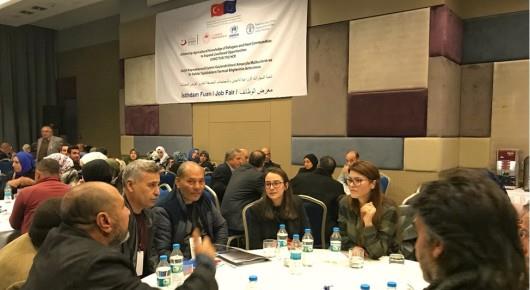At job fairs in Turkey, Syrian refugees capitalize on FAO-led training

Kasim Ibrahim, a Syrian refugee living in Turkey, sees hope for a better future after taking part in an FAO-led vocational training programme this autumn.
He and almost 200 other participants in this programme have had a chance to meet with potential employers in the agricultural sector at a series of job fairs, the last of which is held in Izmir today. The project, funded by UNHCR, was developed to help Syrian refugees and their host communities expand livelihood opportunities through enhanced agricultural knowledge.
Today’s job fair marked an end of a three-month training programme in which participants studied in a language course and received practical, on-the-job trainings at farms and private companies in the food and agriculture sector.
With their certificates in their pockets, participants have now met, face-to-face, private companies representing potential employers in the area of their training.
Kasim Ibrahim worked at greenhouse during the practical part of this programme. This week, exploring employment possibilities, he attended one of the last job fairs. The fairs have been held in all six provinces in which the programme was implemented.
“I met an owner of a huge number of greenhouses,” he said. “He needed seven or eight people on a permanent basis to expand his business, so we have exchanged contact details.”
It is the second year in row that FAO has worked to increase the employment opportunities of Syrian refugees and people from their host communities within the agriculture sector in Turkey. FAO works in close collaboration with Turkey’s Ministry of Agriculture and Forestry and the provincial directorates with high numbers of refugees who fled from the eight-year-old conflict in the Syrian Arab Republic across the border – namely, Izmir, Mersin, Adana, Gaziantep, Sanliurfa and Mardin.
In total, 865 people participated in the programme and received certificates for completion this year. The programme targets 70 percent Syrian refuges and 30 percent Turkish citizens from the host communities, with an overall participation of women of at least 30 percent. At the job fair in Sanliurfa this week, one of those women, 25-year-old Diana Mohammed Ali, got a job on the spot.
“At the on the-job-training, I was working on an olive farm, learning the different skills needed for such work,” she said. “Today, I was introduced to an olive farm owner, and I will start to work there tomorrow. I’m so happy.”
The number of private companies participating at each job fair varied from 12 to 30, with around 70 to 170 trainees in attendance. Many of the trainings either become registered with the Turkish Employment Agency İş-Kur during the job fair, which entitles them to labour force services, or find a job at one of many agricultural companies.
“This is a very promising result from the job fair,” said Sheikh Ahaduzzaman, FAO’s Ankara-based programme officer, noting that the goal for this programme is a 25-percent employment rate for the trainees.
“The programme is in its second phase, and FAO is now planning for the third implementation phase, expanding into four new provinces,” Ahaduzzaman said.
6 December 2018, Izmir, Turkey
